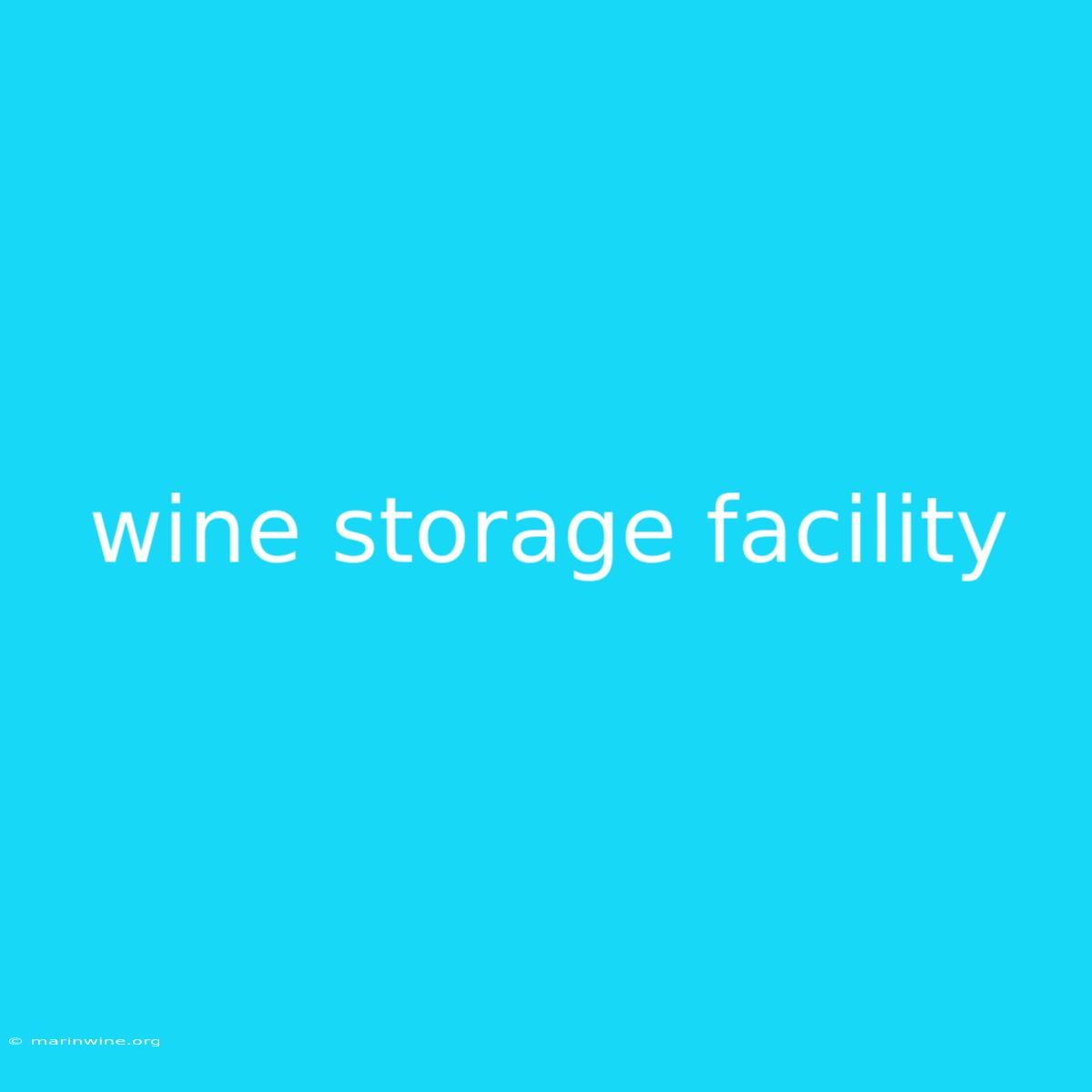Uncorking the Secrets: A Deep Dive into Wine Storage Facilities
Have you ever wondered what happens to your favorite bottles of wine after you purchase them? The answer lies in the carefully controlled environment of a wine storage facility. These facilities are essential for preserving the delicate flavors and aromas of wine, ensuring that your investment in fine vintages remains intact.
Why It Matters: Wine storage facilities are crucial for preserving the quality and value of your wine collection. They provide a controlled environment that protects your bottles from damaging factors like temperature fluctuations, humidity, and light exposure. This ensures that your wine ages gracefully, reaching its peak potential.
Key Takeaways of Wine Storage:
| Feature | Importance |
|---|---|
| Temperature Control | Consistent temperatures prevent oxidation and premature aging. |
| Humidity Control | Optimum humidity levels safeguard against cork drying and bottle damage. |
| Light Protection | Exposure to UV light can degrade the wine's flavor and color. |
| Vibration Mitigation | Vibrations can disturb the wine's sedimentation and affect its clarity. |
| Secure Storage | Facilities offer security measures to protect your valuable collection. |
Wine Storage Facility
Introduction
Wine storage facilities, also known as wine cellars or wine warehouses, are specially designed structures that cater to the unique requirements of wine preservation. These facilities play a vital role in safeguarding your wine investment, ensuring that your bottles age gracefully and retain their optimal flavor profiles.
Key Aspects
Temperature Control
Maintaining a consistent temperature is paramount for preserving the delicate balance of flavors and aromas within a bottle of wine. Ideal temperatures for long-term storage typically range between 50°F and 55°F (10°C and 13°C). Consistent temperatures prevent rapid oxidation, which can lead to premature aging and a loss of flavor.
Humidity Control
Humidity levels within the storage facility are equally critical. Optimal humidity ranges between 60% and 75%, maintaining the moisture content of the corks and preventing them from drying out. Dried corks can lead to air leakage and oxidation, compromising the wine's quality.
Light Protection
Exposure to ultraviolet (UV) light can degrade the wine's flavor and color over time. Wine storage facilities employ various methods to prevent light exposure, such as using opaque containers, shielding windows, and employing dim lighting.
Vibration Mitigation
Vibrations can disrupt the wine's sediment and affect its clarity. Wine storage facilities are designed to minimize vibrations by using stable foundations, isolating equipment, and minimizing human activity within the storage area.
Security Measures
Wine storage facilities prioritize the security of your valuable collection. They implement stringent measures to safeguard your wines, such as surveillance systems, access control, and insurance coverage.
Wine Storage Options
There are several options available for storing your wine, each offering unique advantages:
Private Wine Cellars
These are individually owned and operated storage facilities that provide a personalized experience. They offer flexibility in terms of storage conditions and access.
Commercial Wine Storage Facilities
These facilities cater to a larger clientele, offering a range of storage options, including individual lockers, shared storage, and temperature-controlled rooms.
Home Wine Storage Solutions
For smaller collections, home wine storage solutions such as wine refrigerators, climate-controlled cabinets, and specialized racks can offer suitable environments.
Factors to Consider
When choosing a wine storage facility, several crucial factors should be considered:
- Temperature and Humidity Control: The facility should maintain optimal temperature and humidity levels for long-term storage.
- Security: The facility should implement robust security measures to safeguard your collection.
- Accessibility: The facility should provide convenient access to your wine, allowing for easy retrieval and management.
- Cost: Storage costs can vary depending on the facility, size, and type of storage.
- Reputation: Research the facility's reputation and experience in wine storage.
FAQ
Q: What types of wine are best suited for long-term storage?
A: Wines with high tannins, acidity, and aging potential, such as Cabernet Sauvignon, Merlot, and Bordeaux blends, are generally considered ideal for long-term storage.
Q: How often should I check on my wine collection?
A: While regular inspections are not necessary, it is advisable to check on your wine collection at least once a year to ensure that the bottles are in good condition and the storage environment remains stable.
Q: What are some signs that my wine might be damaged?
A: Signs of damage include a bulging bottle, a discolored cork, a cloudy appearance, or a strange odor.
Q: Can I store my wine in my basement?
A: While basements can provide a cool and dark environment, they may not consistently maintain optimal temperature and humidity levels. It is crucial to carefully monitor the conditions and ensure that the basement is suitable for long-term wine storage.
Tips for Wine Storage
Here are some tips for ensuring the best possible storage for your wine collection:
- Store bottles on their side: This allows the cork to remain moist and prevents air from entering the bottle.
- Avoid storing wine in direct sunlight or near heat sources.
- Keep the storage area clean and free of dust.
- Maintain a consistent temperature and humidity level.
- Label your bottles clearly and keep accurate records of your collection.
Summary
Wine storage facilities provide a controlled environment that is essential for preserving the delicate flavors and aromas of your wine collection. By understanding the key aspects of wine storage, you can ensure that your investment in fine vintages remains protected and ages gracefully, reaching its full potential.
Closing Message: Investing in wine storage is an investment in the enjoyment and appreciation of your wine collection. By choosing a reputable facility and following proper storage guidelines, you can ensure that your treasured bottles continue to age beautifully, awaiting the perfect moment to be uncorked and savored.

